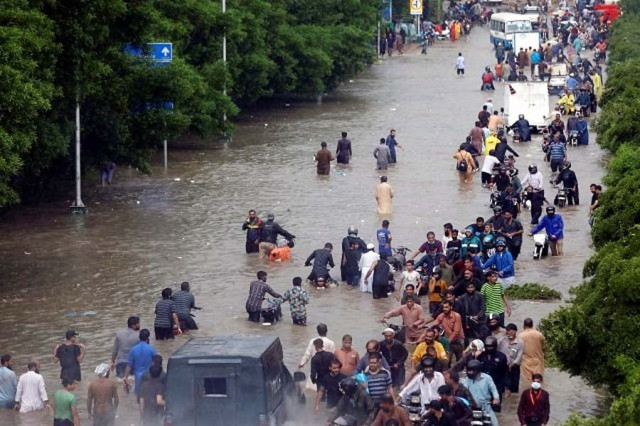Abdullah Abbas waded through Lahores flooded streets and struggled to push his motorcycle and deliver a food order on time. The water had risen to his upper body, his jeans soaked and rolled up over sandals, leaving him vulnerable to electrocution and infectious diseases.
“If I don’t deliver the orders, my account will be blocked, which would leave me without money,” Abbas told AFP in the old neighborhood of Lahore, known for its narrow, overloaded streets. “I need this money to pay my fees for high school,” added the 19-year-old, who ends his last year in high school.
Since June, monsoon rains in Pakistan have killed more than 1,000 people, swelling of larger rivers and devastating rural areas along their banks. City centers like Lahore, a city with more than 14 million people, and Karachi, the country’s largest city with more than 25 million people, also has some urban flooding partly due to poorly planned development.
Abbas earns about $ 7 a day over the average salary, but only when the sun is shining.
To accommodate the average monthly salary of about $ 140, he had to work seven days a week for over 10 hours mounted around his studies.
“Customers behave rude and you have to deal with all the stress,” added Muhammad Khan, a 23-year-old rider as he carefully navigated his motorcycle through Karachi’s muddy, Pothole ridden roads.
Pakistan, where 45 percent of people live below the poverty line, are among the countries that are most vulnerable to climate change, with limited resources dedicated to adaptation.
By mid -August, Pakistan had already received 50 percent more monsoon rainfall than last year, according to the disaster authorities, while the annual rainfall in nearby India kills hundreds every year.
While South Asia’s seasonal monsoon brings precipitation that farmers are dependent on, the climate change makes the phenomenon more erratic.
A report from the Human Rights Commission of Pakistan said that brown water that floods the city’s streets is not only the result of climate change, but “clogged drains, inadequate disposal of solid waste, poor infrastructure, intervention, elitist housing community.”
Doctors warn that work repeatedly under humid conditions can cause fungal infections and flu, while exposure to dirty water can spread eye and skin infections.
Gig economy workers linked to delivery apps accounted for almost two percent of Pakistan’s workforce – about half a million people – in 2023, according to Fairwork, a project from the University of Oxford.
Fairwork assessed six digital work platforms in the country and everyone has “minimum standards for fair working conditions”. International Labor Organization, meanwhile, says the concerts lack government protection and face systemic violations of international working standards.
Motorcycle rider Muneer Ahmed, 38, said he stopped being a chef and joined a cycling company to become “his own boss”.
“When it rains, customers try to take rickshaws or buses, leaving me out of work,” Ahmed said, still waiting for the side of the flooded street. “Rain is a curse for the poor,” he said, watching the screen on his phone for a new customer.
Daily wage workers, who often work in construction, also see their work dry up. It was almost four days since the worker Zahid Masih, 44, was hired, he told AFP while taking refuge under a bridge with other Freemasons in Karachi.
“Jobs come up, but only after the rain stops. There is no work as long as it rains,” the father told three. “Sitting at home at home is not an option as our stoves won’t be turned on.”



